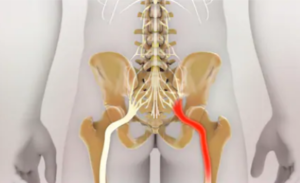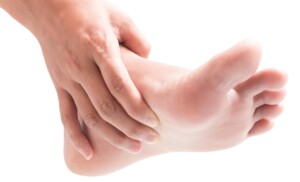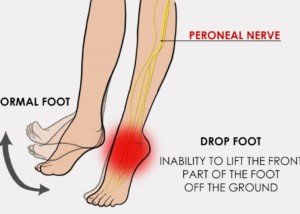Are there ways to tell the difference between an ALS foot drop and one caused by a pinched nerve in the low back?
Foot drop is a classic symptom of amyotrophic lateral sclerosis.
However, this alarming symptom has many other possible causes, including a compressed or “irritated” nerve in the low (lumbar) back. A herniated disc is a common cause of the so-called pinched nerve.
If you’ve been experiencing (or think you have) foot drop lately, and are well-aware that ALS can cause it, perhaps you’ve been wondering:
• Is there a difference between the foot drop of ALS and a pinched nerve as far as the way it appears?
• Would the nature of the drop be different between the two conditions?
• Would there be associated symptoms of the two conditions that would differ?
“The associated symptoms would distinguish foot drop from ALS from foot drop related to a pinched nerve,” says Mitzi J. Williams, MD, clinical neurologist with Morehouse School of Medicine and clinical advisor for the Multiple Sclerosis Foundation.
“The actual symptoms of foot drop are similar,” continues Dr. Williams.
“A person with foot drop can’t pull their foot up to walk properly. Someone may notice their foot dragging or slapping the ground while walking, and as a result may have to overcompensate by lifting their leg higher to clear it from the ground.”
If you’re suffering from perceived weakness – an imagined muscle weakness that’s triggered by fear of a serious neurological disease – your “foot drop” will not be real.
In short, you should still be able to do the things you’ve always been able to do without a deficit in motor ability such as run up a flight of stairs, take a Zumba class or go on a hike.
But if your foot drags and slaps on the floor as you walk, and you must lift the leg higher to clear the foot from the floor – you may have clinical foot drop.
“If a person has ALS, they will have associated weakness in other areas or fasciculations in the muscles of the body,” says Dr. Williams.
• Is your entire leg weak? (Make sure this isn’t only perceived.)
• Are your arms unusually weak?
• Do you have sudden problems gripping common everyday items?
• These associated symptoms suggest a disorder affecting the motor neurons, and ALS isn’t the only one that does this.
Pinched Nerve in the Low Back

Shutterstock/Nathan Devery
“If the symptoms are due to a pinched nerve, the affected person may have back pain that radiates or travels down the leg, or a history of an injury to the extremity that may have damaged the nerve in that area,” says Dr. Williams.
A common condition that involves an irritated nerve in the leg is sciatica.
Though this commonly causes sudden shooting or sharp pain down a leg or in the butt, it can also cause foot drop. There may also be tingling or numbness in the butt or leg.
Shooting pain, tingling and numbness are not associated with ALS. Though tingling, numbness and foot drop can be caused by multiple sclerosis, the sudden episodes of sharp pain streaking down the leg are strongly suggestive of a pinched or compressed lumbar nerve.
Additional Causes of a Pinched Low Back Nerve
Dr. Williams says that “with a pinched-nerve imaging of the lower back with MRI or X-ray may show evidence of arthritis or degenerative disease that is compressing the spinal cord or nerve roots related to the side of the foot drop.”
In much rarer cases, an imaging study may pick up a tumor.
“EMG testing could also show abnormal signals in the back muscles or leg muscles that supply the affected nerves.”

Dr. Williams is author of “MS Made Simple: The Essential Guide to Understanding Your Multiple Sclerosis Diagnosis.” She is a member of the American Academy of Neurology.
 Lorra Garrick has been covering medical, fitness and cybersecurity topics for many years, having written thousands of articles for print magazines and websites, including as a ghostwriter. She’s also a former ACE-certified personal trainer.
Lorra Garrick has been covering medical, fitness and cybersecurity topics for many years, having written thousands of articles for print magazines and websites, including as a ghostwriter. She’s also a former ACE-certified personal trainer.
.



























